

International Human Dimensions Programme. The International Human Dimensions Programme on Global Environmental Change (IHDP) is a research programme that studies the human and societal aspects of the phenomenon of global change.
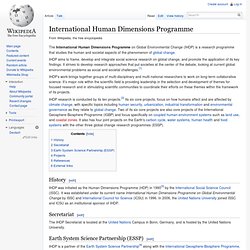
IHDP aims to frame, develop and integrate social science research on global change, and promote the application of its key findings. It strives to develop research approaches that put societies at the center of the debate, looking at current global environmental problems as social and societal challenges.[1] IHDP’s work brings together groups of multi-disciplinary and multi-national researchers to work on long-term collaborative science.
Start - IHDP. The World as a Process: Simulations in the Natural and Social Sciences. Hartmann, Stephan (2005) The World as a Process: Simulations in the Natural and Social Sciences.
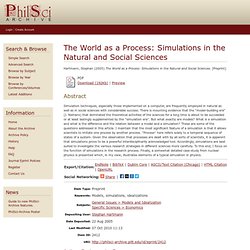
[Preprint] Simulation techniques, especially those implemented on a computer, are frequently employed in natural as well as in social sciences with considerable success. There is mounting evidence that the "model-building era" (J. Niehans) that dominated the theoretical activities of the sciences for a long time is about to be succeeded or at least lastingly supplemented by the "simulation era".
But what exactly are models? Earth System Governance Project. The Earth System Governance Project[1] is a long-term, interdisciplinary social science research programme developed under the auspices of the International Human Dimensions program on Global Environmental Change, and started January 2009.
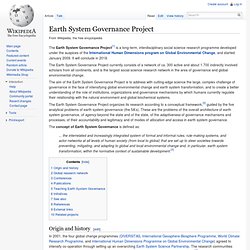
It will conclude in 2018. Earth System Governance. 4x & turn based. EarthOS « Mind of Matt. Most of us Europeans might be heading for a severe economic crisis, including mass impoverishment, food supply shortages, restricted personal mobility, and cutdowns on medical care.
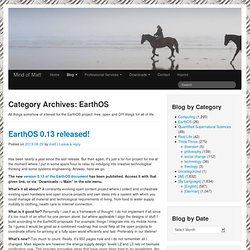
To err on the right side, let’s say, all of us are heading for a really severe such crisis. And some of us are in it – Greece is cutting edge, they’re the front warriors now … With this approaching, I thought repeatedly what simple, fast to set up system could bring us safely through such a time. Because we won’t have much time and resources left to set up something once the crisis is there, and before it, hardly anybody cares … . Here’s what I came up with so far … nothing’s finished, but it might offer some inspirations. What seems clear is that this resilience has to be provided in a local environment: the trans-local systems are broke then anyway, there’s no critical mass of people with enough resources to fix them in the near term, and lack of fuel etc. restricts activity to the local area naturally.
The Countervailing Power of Networks and Super-Empowered Individuals. World Game. World Game. World Game, sometimes called the World Peace Game, is an educational simulation developed by Buckminster Fuller in 1961 to help create solutions to overpopulation and the uneven distribution of global resources.
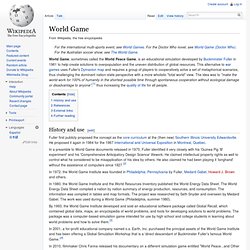
This alternative to war games uses Fuller's Dymaxion map and requires a group of players to cooperatively solve a set of metaphorical scenarios, thus challenging the dominant nation-state perspective with a more wholistic "total world" view. The idea was to "make the world work for 100% of humanity in the shortest possible time through spontaneous cooperation without ecological damage or disadvantage to anyone",[1] thus increasing the quality of life for all people. History and use[edit] Fuller first publicly proposed the concept as the core curriculum at the (then new) Southern Illinois University Edwardsville. He proposed it again in 1964 for the 1967 International and Universal Exposition in Montreal, Quebec. In 2001, a for-profit educational company named o.s. References[edit] EarthOS.pdf (Objet application/pdf) O.s. Earth - The Global Simulation Workshop. About the Conference. Integral City 2.0: An Online Conference September 4 – 27, 2012 -- Live Event Presentations September 28 – Ongoing -- Resources, Action-Research, and Dialogue We hold a radically optimistic vision for our collective future...
Earth OS Institute. Changing the way we design and construct our world.
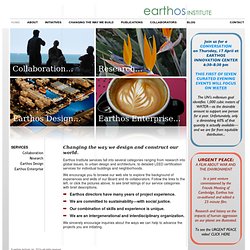
Earthos Institute services fall into several categories ranging from research into global issues, to urban design and architecture, to detailed LEED certification services for individual buildings and neighborhoods. We encourage you to browse our web site to explore the background of experiences and skills of our Board and its collaborators. ABOUT Earthos. Many of our initiatives are designed to support the emergence of the “sustainable economy” through design, graphics, research, and other services.
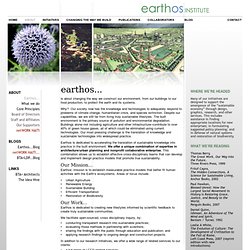
This includes assistance in finding appropriate locations for new enterprises; in formulating suggested policy planning; and in defense of natural systems and restoration of biodiversity. Exemplar Zero. The Operating System For Planet Earth A road-map for imagining a future and the benefits of virtual worlds was laid out at The Serious Virtual Worlds Conference held in Coventry University, England last week.
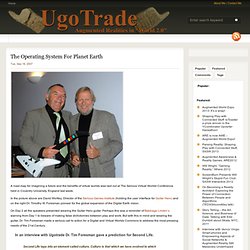
In the picture above are David Wortley, Director of the Serious Games Institute (holding the user interface for Guitar Hero) and on the right Dr. Timothy W. Foresman pioneer for the global expansion of the Digital Earth vision. On Day 2 all the speakers presented wearing the Guitar Hero guitar. Earth Dashboard. Earth System Science. Category:Scientific modeling. Subcategories This category has the following 23 subcategories, out of 23 total.
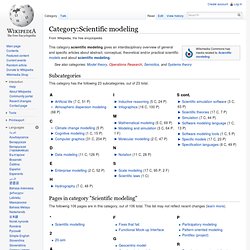
Pages in category "Scientific modeling" The following 106 pages are in this category, out of 106 total. This list may not reflect recent changes (learn more). The Venus Project. Scientific modelling. Example of scientific modelling.
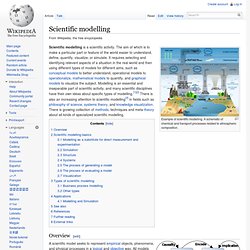
A schematic of chemical and transport processes related to atmospheric composition. Scientific modelling is a scientific activity. The aim of which is to make a particular part or feature of the world easier to understand, define, quantify, visualize, or simulate. It requires selecting and identifying relevant aspects of a situation in the real world and then using different types of models for different aims, such as conceptual models to better understand, operational models to operationalize, mathematical models to quantify, and graphical models to visualize the subject.
Modelling is an essential and inseparable part of scientific activity, and many scientific disciplines have their own ideas about specific types of modelling.[1][2] There is also an increasing attention to scientific modelling[3] in fields such as philosophy of science, systems theory, and knowledge visualization. Overview[edit] Scientific modelling basics[edit] Simulation[edit] Project of the Day: Earth OS. Project of the Day: Earth OS Michel Bauwens 19th September 2012.
Earth OS. = a system orchestrating all the existing free & open ideas so that all aspects of life are served by free, open, P2P tech and services only URL = "This document constituates an early version of EarthOS ("Earth operating system"), which is a system apt for dealing with all natural resources in a sustainable way. This document contains both a framework of design principles and technical interface standards, and also the actual list of equipment items.
EarthOS will finally use only free and open DIY technology. Next to sustainability, it focuses on independent / autarkic and resilient living, while also maintaining a reasonable standard of living. Note that this document is currently just a long collection hints to existing free and open projects and a list of own ideas, far from containing all detailed technical instructions.
Paul Hawken's 2009 Commencement Address. The unforgettable Commencement Address 2009. By Paul Hawken When I was invited to give this speech, I was asked if I could give a simple short talk that was “direct, naked, taut, honest, passionate, lean, shivering, startling, and graceful.” No pressure there. Let’s begin with the startling part. Class of 2009: you are going to have to figure out what it means to be a human being on earth at a time when every living system is declining, and the rate of decline is accelerating. This planet came with a set of instructions, but we seem to have misplaced them. The Earth Needs a New Operating System and You are the Programmers. Posted on Tuesday May 26th 2009 Paul Hawken is a personal hero, someone who has led the way in progressive thinking and action for an ecologically sound world. “Basically, the earth needs a new operating system, you are the programmers, and we need it within a few decades.”
About 35,500 results (0.43 seconds) – noosquest
About 34,700 results (0.59 seconds) – noosquest